Bernard Jackman remembers his first impression of a young Cian Healy.
He first spotted him playing Leinster Schools Senior Cup rugby for Belvedere College as a hooker in 2005, but within a couple of years the Clontarf man had been converted to prop and was rubbing shoulders – literally – with Jackman in a Leinster jersey.
"He was the strongest young fella, most powerful young fella I'd ever seen at that level," Jackman tells RTÉ Sport.
"He was able to throw around ridiculous weights, and quite quickly he made an impression."
That 'young fella’ is 35 now. Between his 264 games for Leinster and 123 for Ireland, he’s played just shy of 400 games at the top level, and with another year to go on his contract at the province, you can expect him to hit that mark in the next 12 months.
If he comes off the bench at the Aviva Stadium today, the loosehead will make his 105th appearance in the Heineken Champions Cup, just five short of Ronan O’Gara’s record.
This will be his seventh final, a championship record, moving him out ahead of team-mate Johnny Sexton and Toulouse legend Cedric Heymans on the all-time list.
"Did I think he’d last as long as he did? Probably not," added Jackman, who packed down alongside Healy in Leinster’s first Champions Cup final back in 2009.
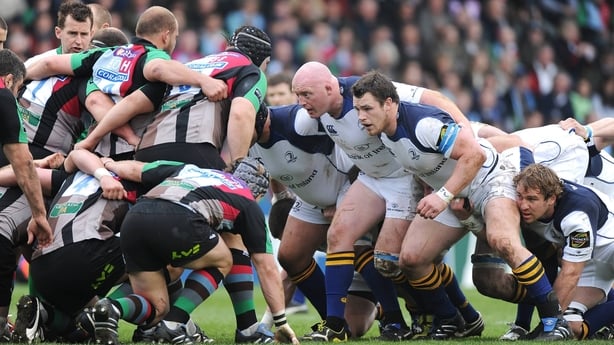
"He wasn't consumed by rugby at the time. He was very dedicated, but he wasn't consumed by it. He was into DJing and different things. Maybe that's what’s helped him, that he wasn't completely consumed by the game.
"He was a different type of personality. He was really nice, but different. He was into skateboarding and BMX and things like that which I was a bit old for and didn’t know much about."
Healy wasn't the only future Ireland international on his Belvedere College schools cup team of 2005, with Ian Keatley kicking a penalty and a drop-goal in their 16-10 win against Blackrock in the final.
Like Jackman, Keatley had a distinct first impression of Healy when the pair met in their early teens.
"I think the first thing I saw about him was the size of his hands. This guy is a freak!" Keatley recalls.
The pair moved on to the Leinster academy together, Keatley acting as "chauffeur" for Healy every morning as they drove down from the northside, while they also played on the same Ireland Under-20 team that won the Six Nations Grand Slam in 2007.
His debut came in May 2007, the province’s final game at Donnybrook before their move to the RDS, with a 19-year-old Healy replacing the retiring Reggie Corrigan in the final quarter.
"He came in, and you’re looking at him thinking, ‘who’s this kid?’," says Jamie Heaslip.
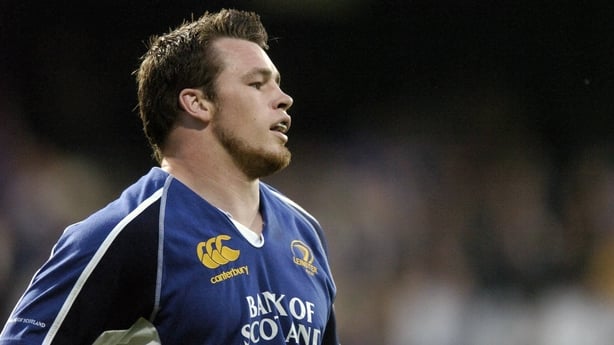
"Given the shape of him, he wasn't the traditional-looking prop. The stuff he was doing on the pitch wasn’t what a normal prop does.
"He came on against Borders, and woah... here’s a prop who’s got a sidestep, an offload, a ball-carrier, he won’t just pin a scrum down, as well as being a complete freak when it comes to strength and explosion.
"He played Australia in his first Irish cap at Croke Park [in 2009], and you knew he was going to be alright then. He was well able to hold his weight. Before we knew it, he was on the 2013 Lions tour and unfortunately got an injury, but probably would have started that series."
For a player of such longevity, and with his collection of medals, it’s taken a remarkable streak of bad luck for him to have missed out on a Test cap with the Lions.
In 2013 he could have been nailed-on to start against Australia but for a bad ankle injury early in the tour, while in 2017 he was still rebuilding his career which had almost been ended by a neck injury two years earlier.
"Some of the injuries he’s had; he suffered bad nerve pain going down his neck, he couldn’t make a closed fist, he could hardly lift up a knife and fork," says Keatley of the 2015 neck surgery which almost led to Healy’s retirement.
In a way, that injury marked the end of Healy’s first career, and the beginning of his second.
In the years leading up to it, he’d been the starting loosehead on three Heineken Cup-winning Leinster sides, as well as picking up two Six Nations Championships with Ireland, and had become one of the most important players for both province and country.
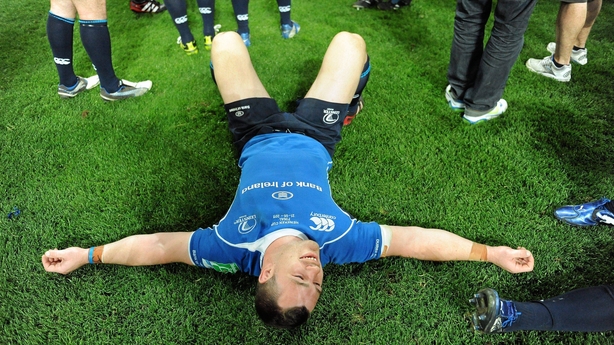
He’s spoken of that 2015 neck injury on several occasions since. For some time after his surgery, his right hand just wasn’t responding.
"I couldn’t write my own name and address," he said in a 2016 interview.
"It was grim enough. I couldn’t put the key in the car ignition, couldn’t put the key in the front door. I became left-handed at everything."
With that left hand, he’d even signed the insurance papers ahead of potential retirement, but shortly after while on holidays in Italy his career was handed back to him when he started to feel some tingling sensation in his fingers.
It wasn’t an instant comeback though. Even though he returned from that disc issue to play at the World Cup just a few months later, he didn’t look like the same player, and with that period also coinciding with fellow loosehead Jack McGrath’s peak years, it was the better part of two seasons before Healy had reestablished himself as the number one in both blue and green.
He made changes to the way he trained and prepared. His previous 125kg rig was trimmed down to 115kg, and while he looked on with envy as McGrath starred on the 2017 Lions tour in New Zealand, Healy found himself in Japan with a youthful and inexperienced Ireland squad.
He didn’t realise it at the time, but it was a turning point in his career.
"He really grew when I saw him in Japan on tour, and he just started taking charge," former Ireland scrum coach Greg Feek said in 2017.
"It was just a natural thing. He talked and everyone listened. They all responded and it looked like he flourished on that."
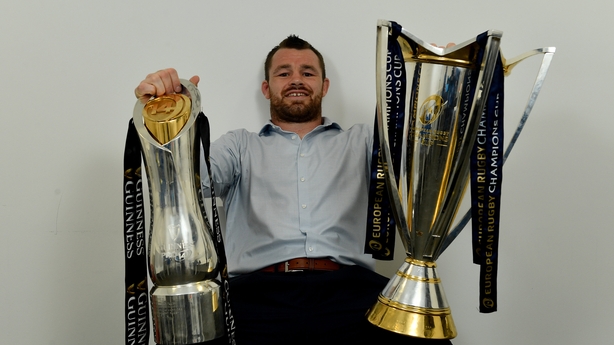
By the following summer, he’d regained his place as the first-choice loosehead for Ireland as they won the Grand Slam in 2018, going on to win his fourth Champions Cup with Leinster ahead of a European and Pro14 double (above).
From being on the brink of retirement, his career has gone on for another eight years and counting, and a fourth Rugby World Cup is on his horizon later this season.
"He could have had his career written off a few times, but he's been able to kick on," Heaslip adds, the former Ireland captain being Healy's long-time room-mate on away trips with the province, while they're also godfathers to each other's kids.
"He's Leinster’s second most capped player, he’s going to be one of Ireland’s most capped players, and if Leinster win this weekend it’ll be five stars on the jersey, and Cian Healy will have played or been involved in all five.
"He definitely invested in himself, be it nutrition, recovery protocols, rehab, prehab. He never had to worry about strength and conditioning. Well, maybe just strength, I always had him on the conditioning part."
His 100% record in Champions Cup finals came to an end in 2019 when he and Leinster were beaten by Saracens in the decider in Newcastle, before they suffered a similar fate in Marseille against La Rochelle a year ago.
In the last two seasons, he's had to transition to to a new role. Andrew Porter's conversion to loosehead has pushed Healy out to the replacements bench for both Leinster and Ireland, but rather than allow himself be put out to pasture, the old dog has learned a couple of new tricks.
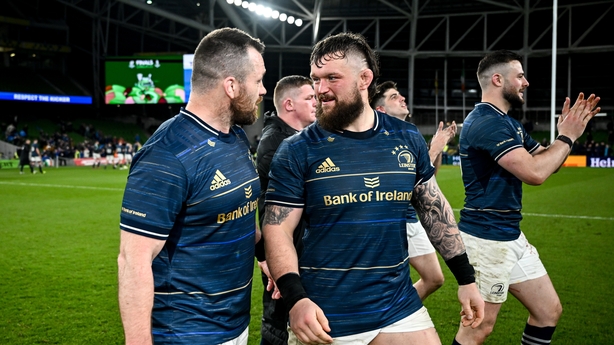
It was a curious sight to see his name listed at jersey number 18 ahead of the opening game of last season against the Bulls, with the then-33-year-old loosehead having upskilled himself as a tighthead to cover the province when they were short of numbers, and he's continued to swap back and forth when needed in the last two seasons.
In March, he went a step further and packed down at hooker for the second half of Ireland's Six Nations win against Scotland at Murrayfield, joining a select few who have played a Test across all three front row positions in the professional era. The feat was made more remarkable by the fact that Ireland's scrum thrived rather just merely treaded water.
"I think it's important when we stand back and look at his entire career, the fact that he’s got that extra couple of years out if it, contributing mainly from the bench, should actually add to his legacy rather than take away from that," said Jackman.
"He relied on power at the start, and was quite a wild and aggressive scrummager. Over the years he combined that power with technique and smarts. It's testament to his professionalism that you don’t stay in the matchday 23 for Ireland if you don’t know your detail and are trusted and relied upon."
Heaslip agrees: "If you look at him there, a lot of other guys might potentially have left once they're not the go-to starter. I think that’s another testament to him, that he's happy to play a role.
"Andrew Porter is number one for loosehead, Tadhg Furlong for tighthead, but he’s happy to be in the background at international and club level. A lot of other guys might have left and chased more lucrative opportunities. He stayed, that’s a testament to him."
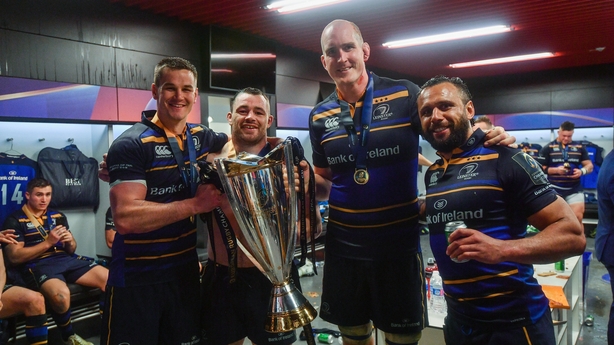
The coming months may put the final decorations on one of Irish rugby's great careers.
His place in today's matchday squad sees him set a tournament record of seven final appearances, while a Leinster victory would see him become the tournament's first five-time winner, two records Sexton would have joined him in setting were it not for his season-ending groin injury.
With 123 Ireland caps, he's 10 short of Brian O'Driscoll's all-time record but would likely need to hang around for another year in Test rugby to break it, while he could also beat Devin Toner's record of 280 games for Leinster with another season in blue.
"I think that guy will go for as long as they let him. I keep saying I'd love to see him go coaching. I don’t know if he wants to do that, but he has so much experience," says Heaslip.
"I often say Cian Healy changed what is expected of looseheads. There would be no Andrew Porter unless there was a Cian Healy. It’s like what Tadhg Furlong is doing for tighthead. He’s transformed the expectations, globally, around what’s expected of looseheads. That’s how much of an influence that guy has had on that position.
"He's got a hard exterior, but a very soft interior, he’s quite a sensitive soul. Obviously very determined, focused and professional. You don’t want to be on the wrong side of him, loyalty is a big thing to him. When he’s got your back, he’s got your back, he’s quite a considerate person."
When he does eventually retire, his future post-rugby appears to be a mystery, but his legacy seems set.
"I'd put him up along with one of Ireland’s greatest players," Keatley concludes.
"He probably doesn’t get the credit he deserves because he’s not in the backs, or the flashy position. To do what he’s done in that area of the field, the front row, for so many years consistently, I think he’s one of Ireland’s greatest rugby players."
Listen to the RTÉ Rugby podcast on Apple Podcasts, Soundcloud, Spotify or wherever you get your podcasts.
Watch the Heineken Champions Cup final, Leinster v La Rochelle, on RTÉ2 and RTÉ Player on Saturday from 4pm, follow a live blog on the RTÉ News app or RTÉ.ie/Sport or listen to live commentary on Saturday Sport on RTÉ Radio 1


